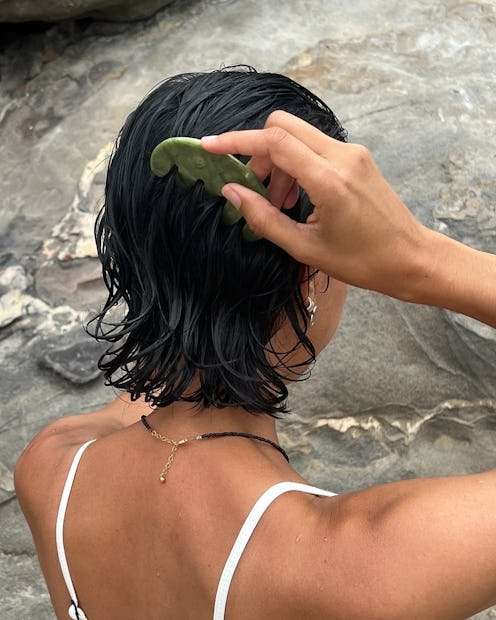Anyone who takes hair care seriously usually has a plethora of shampoos, conditioners, hair masks, oils, and detanglers on deck. But a key piece that’s frequently glazed over is scalp care. There’s often so much emphasis on how to grow longer, thicker strands or how to repair split ends, but hair health begins with properly treating the skin on your scalp. Like the TLC you regularly give your face by slathering on lotions and potions, this area deserves the same level of attention. With a scalp routine that targets your individual concerns and cover hair care basics, you’ll end up with stronger, flourishing hair.
If you’re not sure where to start, TZR has tapped two trichologists to guide you on scalp care basics. This includes why establishing a routine is so important and the common mistakes you might be making. Plus, they debunk hair myths about washing schedules and give the best product recommendations.
Keep reading for a detailed breakdown on how you should be incorporating a targeted scalp regimen into your weekly hair care routine.
Why Is Scalp Health Important?
“A healthy scalp is the foundation for healthy hair,” says founder of scalp care brand Act+Acre and certified trichologist, Helen Reavey. She adds that the state of your scalp directly influences all aspects of your hair, so avoiding proper care can lead to issues like itchiness, dryness, dullness, and lack of volume.
“Our scalps are overburdened with more buildup than ever from polluted air quality, contaminated water, styling product residue and sebum (natural oil) buildup,” says New York City-based hair growth expert and trichologist, Shab Caspara. “Being an extension of our facial skin, the scalp has been neglected for too long and [this has] manifested into increased hair loss and thinning.” Caspara also notes that because your scalp is like the skin on your face, you also need to direct focus on maintaining a healthy pH, nurturing moisture, and exfoliating just as you would with your skin care routine. Taking these measures will combat the negative scalp conditions previously mentioned and promote the shiny, luscious hair that many crave.
“Remember that the scalp ages six times faster than your face, so it's important to give it the attention it deserves,” says Reavey. “A good scalp care routine should be personalized to your unique needs, taking into account your scalp type, hair health concerns, and environmental factors. Be consistent and patient, and you'll see improvements in your scalp and hair health over time.”
What Should Your Scalp Care Routine Look Like?
The first step of your scalp routine should begin before shampooing your hair, says Reavey. She adds that you should start by using a pre-wash treatment like an oil or a chemical exfoliant once a week. Adding this product into the mix will remove buildup and dead skin cells to leave you with a balanced scalp and prevent bacteria growth. Although she says she finds it hard to find a scrub that doesn’t disrupt the skin’s microbiome, Caspara suggests the Intensive 2-in-1 Scalp Scrub & Shampoo by Biotera because it is both gentle and effective.
After this, it’s time to get shampooing. For several years now, it has been a widespread idea that nobody should wash their hair everyday or even multiple times a week, but according to Reavey and Caspara this isn’t the case.
“Wash more often that you think,” says Caspara. “Side effects from buildup aren't always visible to the naked eye, but with a trichoscope, I can see everything including irritated and shrinking hair follicle openings.”
In addition, all hair and scalp types are different and people face various external environmental factors, so how you address washing and your routine must be personalized to you.
“For oily hair types, washing every one to two days is recommended, while [dryer] coily and kinky textures can go for a week or more between washes,” says Reavey. “[For] curly hair, [wash] every three or four days; and hair types that are not especially dry or oily, every two or three days.” Reavey adds that focusing your shampooing on the scalp versus the strands is very important in making sure the skin is unsoiled and it helps promote blood flow, allowing the scalp to be stimulated. Outside of texture, those who naturally have more buildup, work out regularly, and style their hair using a lot of product should be washing more consistently, says Reavey.
When it comes to the type of shampoo you use, Reavey says that you should be using a gentle formula and be double- or triple-cleansing. She also notes that massaging the scalp using a gua sha will also help to circulate blood in the scalp to activate and elate the skin cells.
Just like facial moisturizer is a crucial step in your skin care routine, you can’t forget about hydration on your scalp either. “Our scalps are so neglected and we don't do anything to moisturize it, so a nourishing and hydrating leave-on serum that has skin care active ingredients promotes cell turnover and strengthens new hair,” says Reavey. These actives include the apple stem cells, hyaluronic acid, and bamboo and a pea sprout blend that power the Act+Acre Stem Cell Scalp Serum.
What Are Some Common Scalp Care Mistakes?
Caspara says that a common misconception about scalp cleansing is that you should rely heavily on your nails to do the work. “This can cause serious damage to your scalp health by disrupting the microbiome and creating inflammation that hinders hair growth,” says Caspara. So instead, use the pads of your fingers to gently work through your roots.
Additionally, Reavy says that most bad habits revolve around styling practices like using too much heat, wearing tight hairstyles that apply pressure on the scalp, and using products that contain harsh chemicals. You should really be paying attention to ingredients, so that you know your product lineup will treat your scalp kindly.
